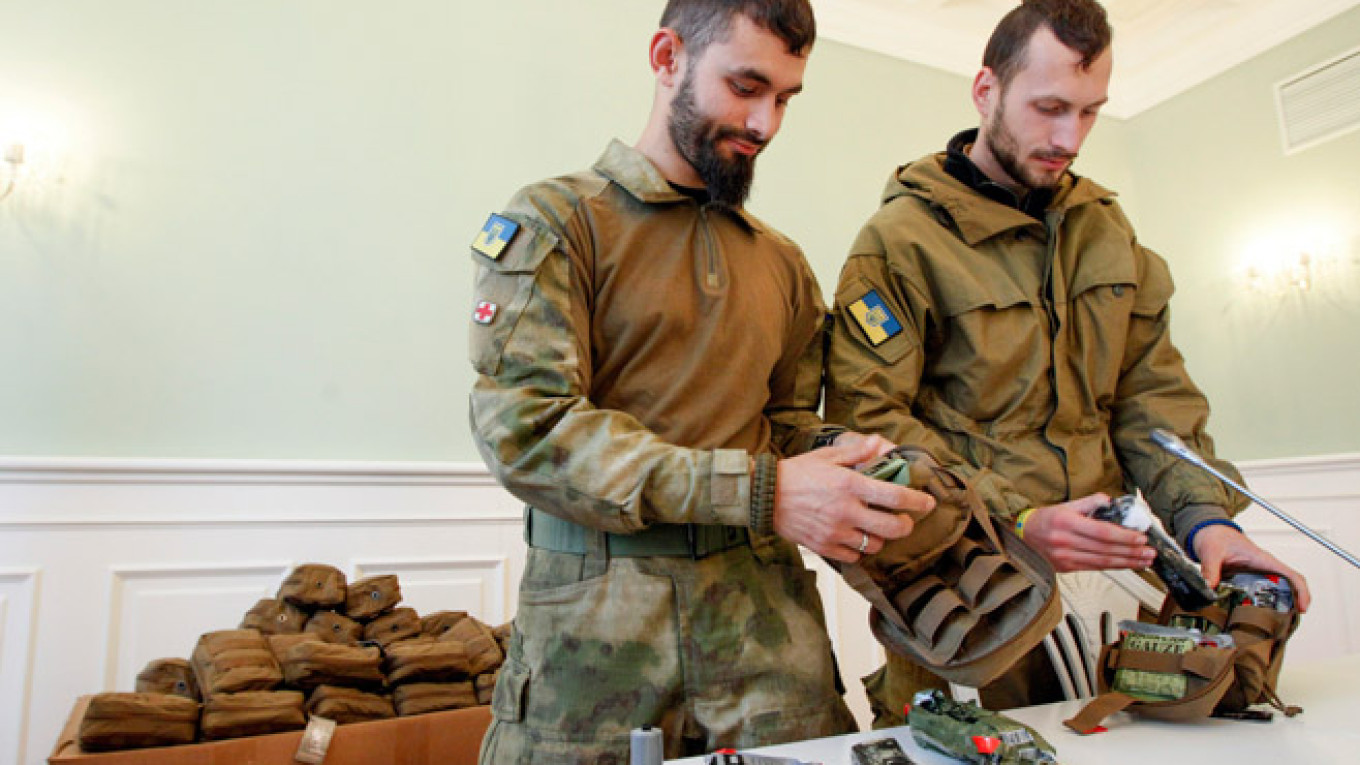President Vladimir Putin's spokesman on Tuesday voiced what Russia wants from the West over Ukraine: guarantees that the former Soviet republic will not join NATO, an outcome that political analysts agree was already unlikely in the year-long conflict that has already claimed 4,000 lives.
"We would like to hear that NATO will stop drawing closer to Russia's borders, that NATO will stop its attempts to disrupt the balance of power," Dmitry Peskov said in an interview with the BBC. "Unfortunately, we have not heard these assurances, and that forces us to worry, since NATO is gradually moving closer to our borders."
Putin cited the threat of further NATO expansion as one of the reasons for annexing Crimea from Ukraine in March, a move that infuriated the international community.
Russia's distrust of NATO is long-standing. Putin has used many platforms to express his stance on NATO expansion, including the 2008 NATO summit in Bucharest.
"A military bloc showing up at our borders would be regarded as a direct security threat," Putin told reporters at the time. "Assurances that these moves are not aimed against us will not be accepted. National security is not built on promises."
Circumstantial Guarantees
Ukraine's current circumstances seem, at first glance, to already constitute a guarantee that it will not join the alliance. The country does not fulfill the alliance's political, military and economic membership requirements. The current territorial disputes over Crimea and the Donbass also put it at odds with NATO's charter.
Ukrainian authorities have not kidded themselves about the prospect of membership, recognizing that the country does not fulfill the organization's criteria and that the alliance would not be willing to accept Ukraine into its fold.
"Even if we sent a request to join NATO, the bloc itself would not be ready for this," Ukrainian President Petro Poroshenko told Bild, a German daily newspaper, on Monday. "Only when we implement reforms in Ukraine and meet the criteria will we be able to ask the population whether they want to join the alliance."
Article 5 of the North Atlantic Treaty recognizes an armed attack on a member as an an assault on all of them. NATO Secretary-General Jens Stoltenberg said Tuesday that Russia was orchestrating a military buildup on its border with Ukraine, as well as on Ukrainian territory, after the alliance released satellite images it said showed Russian forces engaging in military operations on Ukrainian territory earlier this year. Had Ukraine been a member of the organization, NATO would have had to go beyond mere statements.
Building Trust
But circumstantial guarantees that Ukraine will not join NATO in any foreseeable future are insufficient for Russia, pundits told The Moscow Times.
"Russia feels that it has been lied to by the West in many instances," said Alexei Makarkin, deputy director of the Moscow-based Center for Political Technologies think tank. "It doesn't want this to happen again, especially on a sensitive issue it said it was once cheated on: NATO eastward expansion. I assume Russia would request an official document with binding obligations."
Peskov could not be reached Wednesday for clarification of the nature of the guarantee Russia had requested.
Russian authorities have claimed it was agreed during German reunification negotiations in 1990 Russia that NATO would not expand eastward. NATO denies that there was any such agreement and released a statement in April saying that "no evidence to back up Russia's claims has ever been produced." In the last 15 years, 12 European countries — including the three Baltic former Soviet republics — have joined the alliance.
Russian pundits agreed it was highly unlikely that Russia would obtain a written guarantee from the West that Ukraine would not join the alliance.
"Russia doesn't trust NATO, and NATO doesn't trust Russia," political scientist Vladimir Yevseyev said. "Nobody trusts anyone else right now. This type of guarantee would increase mutual trust and predictability in these tense circumstances. I would view this as a positive development."
NATO enlargement is only one of the issues Russia has used to justify its stance on Ukraine, and analysts said a Western guarantee on keeping Ukraine out of the alliance would have no effect on other lingering issues.
"A guarantee on Ukraine not joining NATO would not be enough," Makarkin said. "It will not improve the situation in the country, nor ease tensions. There are a series of other demands Russia has made of the West regarding Ukraine, including the adoption of a special status for the east of the country. These other issues will not change regardless of any official guarantee against Ukraine joining NATO."
Contact the author at g.tetraultfarber@imedia.ru
A Message from The Moscow Times:
Dear readers,
We are facing unprecedented challenges. Russia's Prosecutor General's Office has designated The Moscow Times as an "undesirable" organization, criminalizing our work and putting our staff at risk of prosecution. This follows our earlier unjust labeling as a "foreign agent."
These actions are direct attempts to silence independent journalism in Russia. The authorities claim our work "discredits the decisions of the Russian leadership." We see things differently: we strive to provide accurate, unbiased reporting on Russia.
We, the journalists of The Moscow Times, refuse to be silenced. But to continue our work, we need your help.
Your support, no matter how small, makes a world of difference. If you can, please support us monthly starting from just $2. It's quick to set up, and every contribution makes a significant impact.
By supporting The Moscow Times, you're defending open, independent journalism in the face of repression. Thank you for standing with us.
Remind me later.


